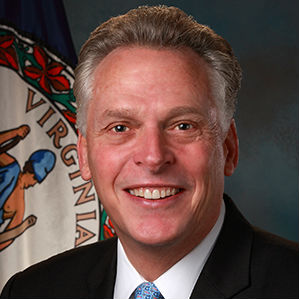While residents of Texas and Louisiana continue facing widespread and historic devastation caused by Hurricane Harvey and the more than 50 inches of rain that fell in some areas, Governor Terry McAuliffe issued an executive order declaring a state of emergency that will allow Virginia to expedite aid to the impacted Gulf Coast areas.

“Virginian’s continue to pray for those still combating the devastating flooding from Hurricane Harvey,” said Governor McAuliffe. “I have pledged the Commonwealth’s aid for whatever the impacted areas request from us. We have already sent swift water rescue teams from Fairfax County, Virginia Beach, and Roanoke, 40 National Guard troops and seven helicopters, two incident management teams, and Virginia Department of Emergency Management personnel to aid in recovery. This executive order will enable us to preposition even more aid to be quickly deployed into the area as needed.”
The order proclaimed that a state of emergency exists, and directed that appropriate assistance be rendered by agencies of both state and local governments to support response and recovery efforts to states affected by Hurricane Harvey, and to alleviate any impediments to the transport of gasoline through Virginia. Pursuant to § 44-75.1(A)(3) and (A)(4) of the Code of Virginia, the order also directed the Virginia National Guard and the Virginia Defense Force be called forth to state active duty to be prepared to assist in providing such aid.
“We anticipate some impacts to the national fuel supply until Gulf Coast refineries can come back on line after flood waters have receded,” said Secretary of Public Safety and Homeland Security Brian Moran. “Until that time, Virginia will work with distributors and neighboring states to ensure critical fuel supplies can traverse Virginia highways as smoothly as possible.”
Private citizens wishing to contribute to the recovery effort are reminded that the best way to contribute to aid efforts is to send cash donations to reputable aid organizations already on the ground in the region.
To participate in the recovery effort, citizens are advised as follows:
TO DONATE TO RELIEF EFFORTS
- The most effective way to support communities impacted by the storms is to donate money and time to trusted, reputable non-profit charitable organizations.
- Donate through a trusted organization. At the national level, many voluntary-, faith- and community-based organizations are active in disasters and are trusted ways to donate to disaster survivors. Individuals, corporations and volunteers can learn more about how to help on the National Voluntary Organizations Active in Disaster (NVOAD) website.
- The Texas Voluntary Organizations Active in Disaster (Texas VOAD) has a list of vetted disaster relief organizations providing services to survivors. Texas VOAD represents more than three dozen faith-based, community, non-profit and non-governmental organizations.
- Cash donations offer these non-profit agencies flexibility to address urgent needs. These organizations can obtain needed resources nearer to the disaster location, not only getting needed supplies to those rebuilding after the storm, but also providing economic aid that helps local businesses from which these emergency supplies are purchased to recover faster.
- Do not donate unsolicited goods such as used clothing, household items, medicine, or perishable food. When used personal items are donated, the helping agencies must redirect their staff away from providing direct services to survivors in order to sort, package, transport, warehouse and distribute items that may not meet the needs of disaster survivors.
TO VOLUNTEER IN THE DISASTER AREAS
Texas is asking volunteers not to self-deploy. Unexpectedly showing up will create an additional burden for first responders. The National VOAD says the situation may not be conducive to volunteers entering the impacted zone and individuals may find themselves turned away by law enforcement.
- Potential volunteers are asked to register with a voluntary or charitable organization of their choice, many of which are already in Texas and supporting survivors on the ground. The National and Texas VOAD websites are offering links to those who wish to register to volunteer with community- and faith-based organizations working in the field.
- To ensure volunteer safety, as well as the safety of disaster survivors, volunteers should only go into affected areas with a specific volunteer assignment, proper safety gear and valid identification.
- Volunteer generosity helps impacted communities heal from the tragic consequences of disasters, but recovery won’t happen overnight. There will be volunteer needs for many months, and years, after the disaster, so sign up now.
To read the contents of the executive order, click here: https://governor.virginia.gov/media/9476/eo-70-declaration-of-a-state-of-emergency-for-the-commonwealth-of-virginia-to-support-response-and-recovery-efforts-in-states-affected-by-hurricane-harvey.pdf










